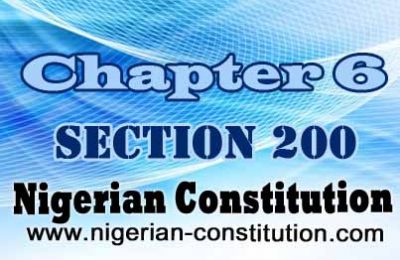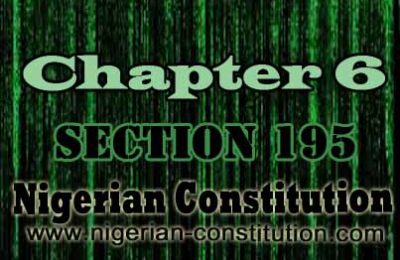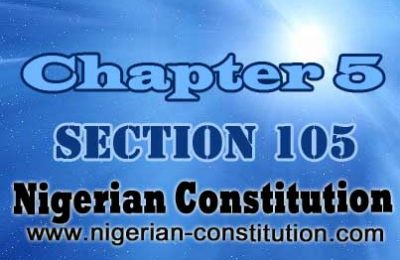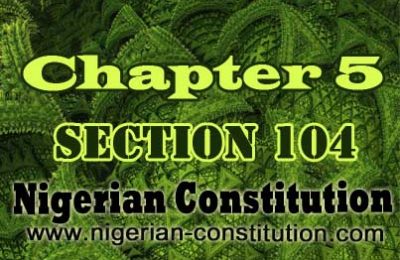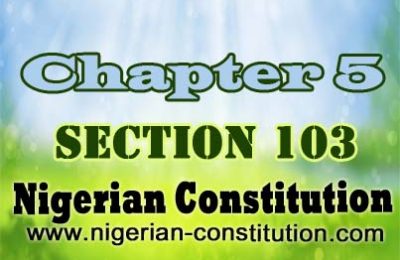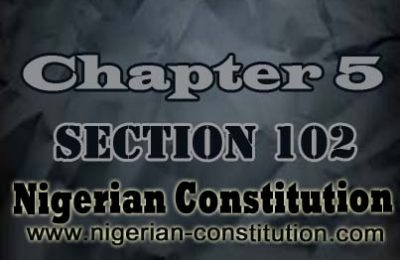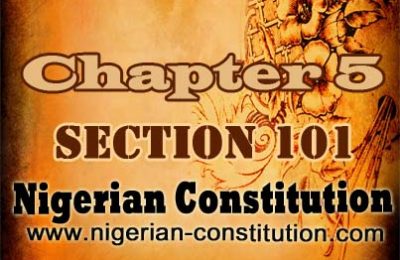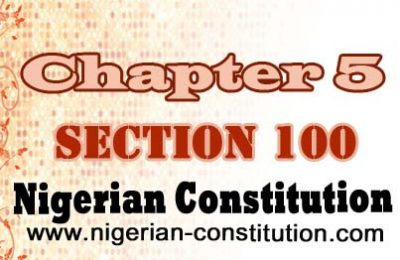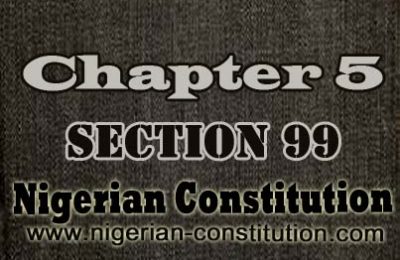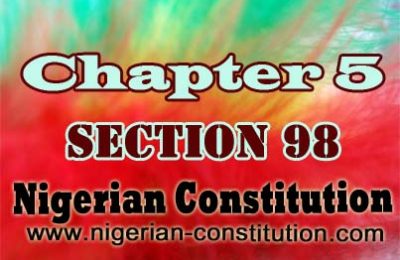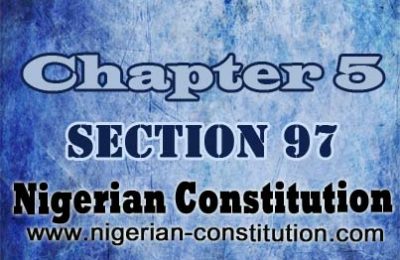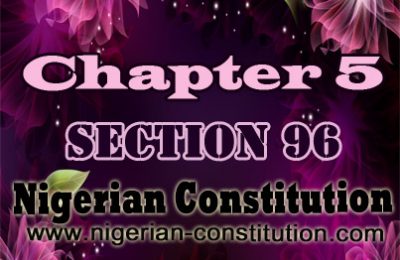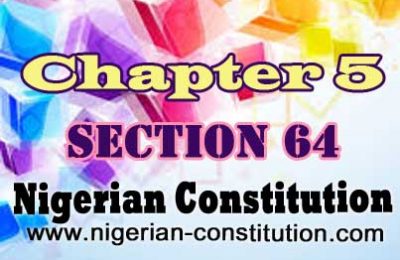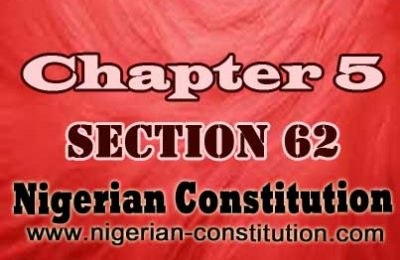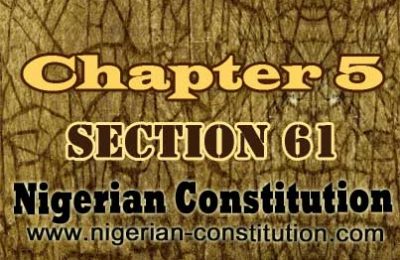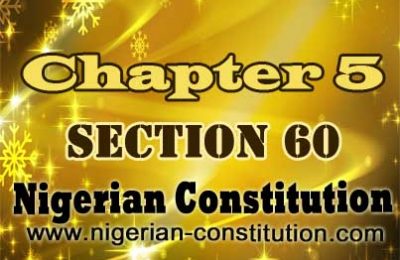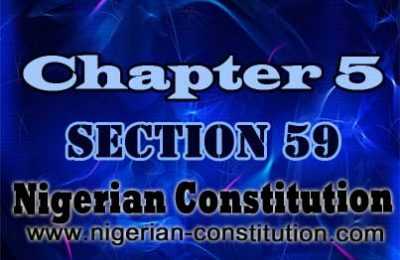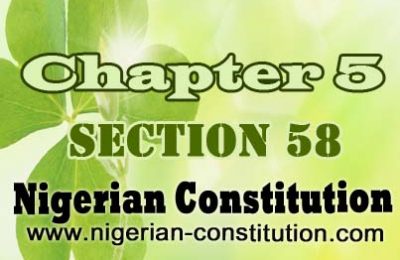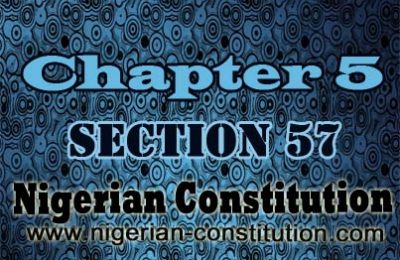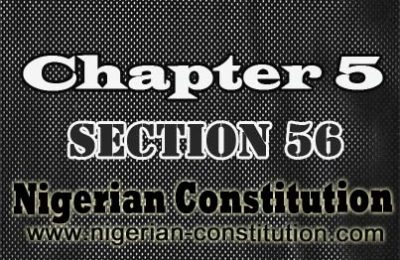Chapter 6. Part 1. Section 200, Download Nigerian Constitution, Nigeria Constitution, Nigerian Constitution, Procedure for Summoning and Dissolution of National Assembly, Qualification for membership, State Executive, The Executive
Chapter 6. Part 2. Section 200. Qualification for membership
Nigerian ConstitutionMarch 30, 2014
(1) No person shall be qualified for appointment as a member of any of the bodies aforesaid if – (a) he is not qualified or if he is disqualified for election as a...
Chapter 6. Part 2. Section 195. Attorney-General of a State
Nigerian ConstitutionMarch 29, 2014
(1) There shall be an Attorney-General for each State who shall be the Chief Law Officer of the State and Commissioner for Justice of the Government of that State. (2) A...
Chapter 5. Part 2. Section 105. Dissolution and issue of proclamation by Governor
Nigerian ConstitutionMarch 23, 2014
(1) A House of Assembly shall stand dissolved at the expiration of a period of four years commencing from the date of the first sitting of the House. (2) If the...
Chapter 5. Part 2. Section 104. Sittings
Nigerian ConstitutionMarch 23, 2014
A House of Assembly shall sit for a period of not less than one hundred and eighty-one days in a year.
Chapter 5. Part 2. Section 103. Committees
Nigerian ConstitutionMarch 23, 2014
(1) A House of Assembly may appoint a committee of its members for any special or general purpose as in its opinion would be better regulated and managed by means of...
Chapter 5. Part 2. Section 102. Vacancy or participation of legislative power of a strangers not to invalidate state proceedings.
Nigerian ConstitutionMarch 23, 2014
A House of Assembly may act notwithstanding any vacancy in its membership, and the presence or participation of any person not entitled to be present at or to...
Chapter 5. Part 2. Section 101. Regulation of procedure
Nigerian ConstitutionMarch 23, 2014
Subject to the provisions of this Constitution, a House of Assembly shall have power to regulate its own procedure, including the procedure for summoning and recess of...
Chapter 5. Part 2. Section 100. Mode of exercising legislative power of a state
Nigerian ConstitutionMarch 23, 2014
(1) The power of a House of Assembly to make laws shall be exercised by bills passed by the House of Assembly and, except as otherwise provided by this section, assented...
Chapter 5. Part 2. Section 99. Unqualified person sitting or voting
Nigerian ConstitutionMarch 23, 2014
Any person who sits or votes in a House of Assembly of a State knowing or having reasonable grounds for knowing that he is not entitled to do so commits an offence and...
Chapter 5. Part 2. Section 98. Voting
Nigerian ConstitutionMarch 23, 2014
(1) Except as otherwise provided by this Constitution, any question proposed for decision in a House of Assembly shall be determined by the required majority of the...
Chapter 5. Part 2. Section 97. Languages
Nigerian ConstitutionMarch 23, 2014
The business of a House of Assembly shall be conducted in English, but the House may in addition to English conduct the business of the House in one or more other...
Chapter 5. Part 2. Section 96. Quorum
Nigerian ConstitutionMarch 23, 2014
(1) The quorum of a House of Assembly shall be one-third of all the members of the House. (2) If objection is taken by any member of a House of Assembly present that...
Chapter 5. Part 1. Section 64. Dissolution and issue of proclamations by president
Nigerian ConstitutionMarch 20, 2014
(1) The Senate and the House of Representatives shall each stand dissolved at the expiration of a period of four years commencing from the date of the first sitting of...
Chapter 5. Part 1. Section 62. Committees
Nigerian ConstitutionMarch 20, 2014
(1) The Senate or the House of Representatives may appoint a committee of its members for such special or general purpose as in its opinion would be better regulated and...
Chapter 5. Part 1. Section 61. Vacancy or participation of strangers not to invalidate proceedings
Nigerian ConstitutionMarch 20, 2014
The Senate or the House of Representatives may act notwithstanding any vacancy in its membership, and the presence or participation of any person not entitled to be...
Chapter 5. Part 1. Section 60. Regulation of procedure
Nigerian ConstitutionMarch 20, 2014
Subject to the provisions of this Constitution, the Senate or the House of Representatives shall have power to regulate its own procedure, including the procedure for...
Chapter 5. Part 1. Section 59. Mode Of Exercising Federal Legislative Power: Money Bills
Nigerian ConstitutionMarch 20, 2014
(1) The provisions of this section shall apply to: (a) an appropriation bill or a supplementary appropriation bill, including any other bill for the payment, issue or...
Chapter 5. Part 1. Section 58. Mode of exercising Federal Legislative power: general
Nigerian ConstitutionMarch 20, 2014
(1) The power of the National Assembly to make laws shall be exercised by bills passed by both the Senate and the House of Representatives and, except as otherwise...
Chapter 5. Part 1. Section 57. Unqualified person sitting or voting
Nigerian ConstitutionMarch 20, 2014
Any person who sits or votes in the Senate or the House of Representatives knowing or having reasonable grounds for knowing that he is not entitled to do so commits an...
Chapter 5. Part 1. Section 56. Voting
Nigerian ConstitutionMarch 20, 2014
(1) Except as otherwise provided by this Constitution any question proposed for decision in the Senate or the House of Representatives shall be determined by the...

